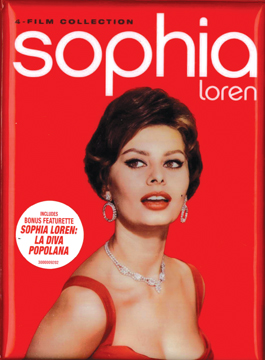home | metro silicon valley index | movies | current reviews | dvd review

Sophia Loren: Four Film Collection
Three discs; Lionsgate; $39.98
By Michael S. Gant
A lot of Sophia Loren in full historical statuesque mode has been out on DVD lately, most notably El Cid and The Fall of the Roman Empire (can a collector's edition of The Pride and the Passion be far behind?). This odds-and-ends collection shows how it all started in 1954's Attila, a vandals-and-sandals epic with Anthony Quinn sporting a bifurcated mustache as Hun-in-Chief. "An irresistible horde of barbarians from the distant deserts of Asia ... is moving toward the rich Western lands," intones the narrator, sounding like a PNAC white paper. Loren plays Honoria, sister of a degenerate Roman emperor. Looking remarkably assured for a 20-year-old, Loren plots against her family (as her mother complains, "At 17, you eloped with a praetorian; you are the embodiment of corruption and betrayal") and offers herself to the sullen Attila, who doesn't bother to stop chewing his food when he kisses her. Loren does sport one terrific plunging-neckline gown with a lattice of jewels across her chest, but she is upstaged by a chorus line of half-clad women cavorting with tridents and spears—the worst Vegas routine in the many centuries before Showgirls. Quinn looks faintly embarrassed by both his ungroomed crow-feather helmet and some tendentious dialogue: "You have to kill to live," Attila declares; "You can't conquer the world shedding innocent blood," argues his defeatocrat brother, Bleda, who will soon be eliminated. The end comes way too quickly (this is the 80-minute American release, not the 100-minute version listed on the DVD box) as Attila meets the pope, the barbarians retreat and an illuminated cross appears in the sky. Carosello Napoletano (Neapolitan Carousel) is a 1954 widescreen color musical touching on a variety of song and theatrical styles indigenous to Naples, loosely connected by the tale of an itinerant hurdy-gurdy man and his family. Loren has a small part as a dance-hall singer in the early 1900s. The highlight is a tragic-clown routine by the great dancer Léonide Massine; the lowlight is an African tribal dance billed as "the attack of the Moors." 1962's Madame Sans-Gêne is a French-Italian comic epic about Napoleon's bawdy laundress and her role in revolutionary affairs. The story is flimsy, but Loren does display a gift for light comedy and slapstick. The most distinguished film is I Girasoli (Sunflower), a 1970 drama by Vittorio De Sica. Loren loves and marries soulful Marcello Mastroianni, who is sent to fight on the Russian front in World War II. He seemingly disappears, but Loren believes that he survived and travels to Russia to find him. The romantic bathos of Henry Mancini's syrupy score is leavened by the easy, sensual byplay between the stars (they made 10 films together all told), but it is hard to believe that this tearjerker was released the same year as De Sica's late masterpiece The Garden of the Finzi-Continis. A short adulatory documentary accompanies this package.
Send a letter to the editor about this story.
|
|
|
|
|
|